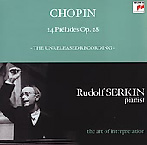The combination of Rudolf Serkin and Frédéric Chopin may come as a surprise to collectors, yet this pianist actually cultivated a repertoire wider than the central Austrian/German classics upon which his reputation rests. Sony’s booklet notes state that Serkin had “good reason” not to sanction the release of his 1976 recording of Chopin’s Op. 28 Preludes. If so, I can’t fathom what that reason was, save perhaps for one or two inconsequential smudges. Serkin’s forceful, unvarnished, and angular interpretation often recalls Arthur Rubinstein’s similarly conceived (if more carelessly detailed) recording from the 1940s.
Like many pianists of his generation, Serkin was not averse to breaking the hands for melodic emphasis and textural variety, as you readily hear in the simpler, lyrical movements. At the same time, Serkin eschews many “traditional” rubatos and phrasing conventions, such as the unwritten ritard most pianists impose upon No. 17’s introductory measures. By playing No. 18 in tempo with little rubato and no melodrama, the unison octave outbursts make an unusually blazing impact. By contrast, Serkin shares Arrau and Barenboim’s unconventionally deliberate view of No. 14, stressing Chopin’s pesante expressive direction rather than his Vivace tempo marking. Some listeners may want more lightness and delicacy in No. 3’s flickering left-hand runs, although the power and clarity in Nos. 8, 16, 19, and 24 remind us how Serkin could still rise to and vanquish virtuosic challenges in his later years.
The Mendelssohn Prelude and Fugue derives from the same sessions and finds Serkin on peak form. The Prelude’s arpeggiated textures roll and crest like torrential waves, while Serkin’s unrelenting drive and long-lined concentration in the Fugue leave the listener limp and exhilarated. In all, this is a release no Rudolf Serkin enthusiast will want to miss.
































